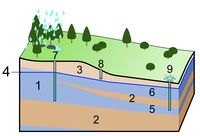
Photo from wikipedia
The effect of spring snowmelt infiltration in a seasonal soil frost area on groundwater recharge was evaluated by systematically monitoring meteorological factors, soil temperature and humidity, groundwater table and temperature,… Click to show full abstract
The effect of spring snowmelt infiltration in a seasonal soil frost area on groundwater recharge was evaluated by systematically monitoring meteorological factors, soil temperature and humidity, groundwater table and temperature, electrical conductivity, and the value of δ18O in a small field site over a 2-year period. The variation of soil temperature and humidity, groundwater table during the freezing period, and the snowmelt period respectively, as well as their correspondence to the relevant environmental factors, and the influencing factors of the permeability of frozen layer were analyzed. The results showed that the evaluation of precipitation infiltration in seasonal soil frost areas should be divided into three stages: a non-freezing period, a freezing period, and a snowmelt period. Snow is the main form of precipitation during the freezing period, and groundwater cannot be recharged. During the snowmelt period of spring, the snow cover that accumulated during the freezing period infiltrates together with rainfall and has a significant effect on groundwater recharge. The general precipitation infiltration process occurs after the frozen soil thaws completely. These research results can improve the accuracy of groundwater recharge calculations for snowmelt infiltration in the seasonal soil frost area of Northeast China and provide a scientific basis for the evaluation and management of regional water resources.
Journal Title: Environmental Monitoring and Assessment
Year Published: 2019
Link to full text (if available)
Share on Social Media: Sign Up to like & get
recommendations!